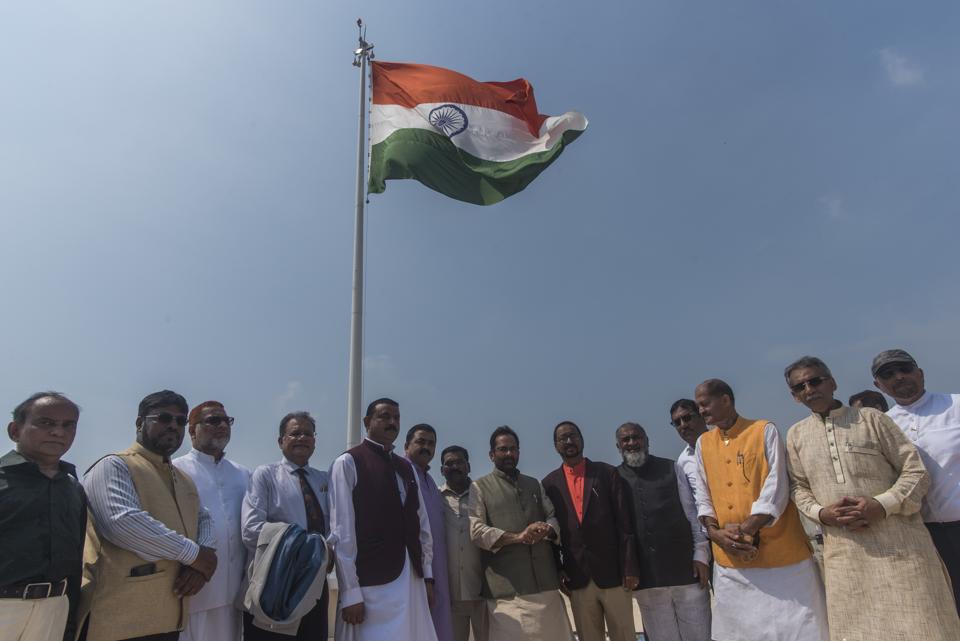Mumbai, MAHARASHTRA :
Muzammil Sayyed, a trainee at the centre from Latur, said, “We got a boost after three of our seniors cracked the UPSC examination.”

The civil services coaching centre at the city’s Haj House, which until now has had limited success in pushing Muslim youth towards civil services, got a boost, after three of its alumni were recently selected by the Union Public Service Commission (UPSC).
Junaid Ahmad, who hails from Bijnaur in Uttar Pradesh and was trained at the IAS and Allied Coaching and Guidance Cell, run by the Centre’s Haj Committee of India (HCI), for two years between 2013 and 2015, ranked third nationally in the UPSC examination. The other two successful aspirants – Zaib Shaikh, from Ahmednagar, and Mohammed Mustafa Aejaz, from Mehboob Nagar in Telangana – were placed at the 225th and 613th positions, respectively.
An HCI official said the news of these achievements has generated a renewed interest and awareness about the coaching facility among the community. “Ever since the UPSC results were declared [on April 5], we have been receiving enquiry calls from all across the country. I still get around 50 calls every day,” he said.
Muzammil Sayyed, a trainee at the centre from Latur, said, “We got a boost after three of our seniors cracked the UPSC examination.”
Last year, as many as 6,732 graduates from across the country had applied for the centre’s entrance test, up from around 1,500 registrations in 2017. This year, the HCI officials expect the number of applications to increase even further – the last day to apply is May 7.
The Cell was established in August 2009, in the backdrop of the Sachar Committee report, which found that Muslims lagged behind most of the other communities in the country in educationally, economically and politically. The report, released in November 2006, pointed out that while Muslims constitute 14% of the Indian population, they only comprise 3% of the civil services and 4% of the police service. Since then, the Muslim representation in civil services has improved to some extent. Of 1,099 candidates who cleared the civil services examination last year 50 (4.5%) were Muslims, the highest since Independence. So far, the coaching centre has produced seven UPSC achievers, including the three who were selected this year. Several other alumni have joined other government agencies, including Reserve Bank of India, Central Excise Department and various state services.
“The cell is good for freshers as it helps in clearing the UPSC preliminary examination,” said Mohammed Mustafa Aejaz.
According to SAM Hashmi, the founder director, who headed the cell between 2010 and 2013, lack of proper leadership at HCI and the cell is to be blamed for its slow progress. “The leaders lacked either academic experience or administrative experience or both,” said Hashmi, who was principal at Akbar Peerbhoy College, Grant Road, and now heads a coaching academy at Mumbra.
In the last ten years, the cell has had four directors. Anwar Khatau, the current director, has previously served at the accounts section of HCI as well as the state’s Maulana Azad Minorities Financial Development Corporation Limited. He was appointed in 2017.
The cell has been experimenting with various coaching techniques, including video lectures and in-person lectures. Last year, the HCI switched back to in-person lectures by faculty from a Pune-based academy, after video lectures by a Delhi-based academy failed to deliver desired results. MA Khan, who was appointed the chief executive officer (CEO) of HCI last year, said the cell is trying to extend every possible support to its students and alumni. “We are providing books, residence and monetary help to our former students for service-specific training at their own place. We have even roped-in non-government organisations for this purpose. We fulfil all the demands of the students of the current batch of the students. In fact, we sought their approval before appointing the faculty,” he said.
Among other changes, the HCI has also done away with the deeniyat (religious knowledge) section of the entrance test and admitted aspirants solely on the basis of their knowledge relevant to civil services. It has also introduced weekly tests and facilitates weekly interactive sessions with faculty. The cell has also encouraged interaction among students, including inter-gender interaction, which was discouraged until now. The students said that the environment at Haj House is conducive for preparing for civil services examinations. “After a year of coaching at Haj House, I stayed here for another year to prepare for the UPSC exam. I will now leave so other students get the opportunity,” said Rais Shaikh, a trainee from Thane.
Sajid Husain, a trainee from Jalpaiguri in West Bengal said that the Haj House facility needs wider publicity. “Many are still unaware of the scheme,” he said.
“There’s a proposal to start such coaching centres at the state-level Haj committee facilities,” said Sayyed.
source: http://www.hindustantimes.com / Hindustan Times / Home> Mumbai / by Hindustan Times, Mumbai / April 22nd, 2019








